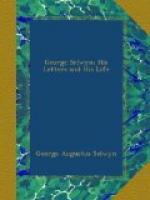Morpeth I hope will be settled to your satisfaction for this time by the help of the Duke of Grafton, and in all future times by no means but what are in your hands. I hope as soon as I come to town to find the St. Andrew(15) ready to be sent, and shall by this post send a quickner to Hemmins; if a courier goes before I come, I hope he will carry it. Lady Carlisle(16) was to go and see it. I take it for granted that Sir W. Musgrave(17) will have an eye to the courier’s going. I believe, at least the papers say so, the other two Ribbands are given away; so yours must be dispatched, of course. What would I not give to see your Investiture! What indeed would I not give to be with you on more occasions than that! I know nobody but Charles that I should not envy that pleasure, but il en est tres digne by knowing the value of it.
I shall be in pain till I hear again concerning Lord Holland(18); il fait une belle defense, mais il en demeure la a ce qu’il me paroit; I see nothing like a re-establishment. Ses jours sont comptes au pied de la lettre. I beg my best and kindest compliments to him, Lady Holland,(19) and to Charles, to whom I wrote by the last post. I desired him to do me the favour to stick a pen now and then into your hand, that I might hear often from you. I shall be extremely glad to have some of your observations upon the places to which you go; but if that takes up too much time, I shall be contented to know that you are not any more within pistol-shot.
Lord Beauchamp(20) trains on well, as they say, but il n’a pas le moyen de plaire. Lord Holl[an]d’s criticism upon Beauc[hamp] is not just; he will get nine daughters if he goes on as he does, before me; and I thought once it was a hard-run thing between us.
Poor Lady Bol(ingbroke),(21) quelle triste perspective pour elle! J’en suis veritablement touche. Adieu, my dear Lord, pour aujourd’hui. God preserve you from boars of any kind, but one, which is the writer of a long letter; for mine to you cannot be short, or ever long enough to tell you how sincerely and affectionately I am your Lordship’s.
(1) Writing from Matson.
(2) Of Gloucester.
(3) Selwyn rivalled Walpole as an ardent admirer of Mme. de Sevigne (1626-1696) through her “Letters”; he read them assiduously, and passionately collected any information relating to her; prizing the smallest object that had once been hers as a precious relic.
(4) Lady Sarah Bunbury (1745-1826), youngest daughter of Charles Lennox, second Duke of Richmond; great granddaughter of Charles ii.; sister to Lady Holland, Lady Louisa Conolly, and Lady Emily, Duchess of Leinster; divorced from her first husband, Sir Charles Bunbury, the well-known racing baronet, in 1776; married, for the second time, George Napier, sixth son of Francis, fifth Lord Napier, in 1702; mother of the distinguished soldiers, Sir Charles James Napier, Sir George Thomas Napier, and Sir William Francis Napier, the historian of the Peninsular War. Constitutional reasons alone prevented George iii. from marrying her; he settled 1,000 pounds a year on her at Napier’s death in 1807. She was quite blind when she died.




